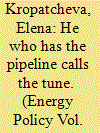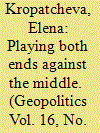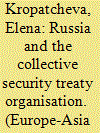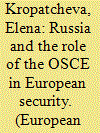| Srl | Item |
| 1 |
ID:
127865


|
|
|
|
|
| Publication |
2014.
|
| Summary/Abstract |
Russian energy policy is usually considered in the regional context - in terms of its energy power capability and strength vis-à-vis the EU and the post-Soviet states. This study shows that in order to understand Russia's energy power, even in the regional context of its relations with the EU, it is necessary to consider the impact of international changes in the energy sector. The oil and gas shale "revolutions" represent such a global factor of influence. Even if their consequences are not yet clear, they have already become an important challenge for Russian energy policy and power. This policy-oriented article, guided by neoclassical realism, analyzes what the shale "revolutions" mean for Russia's energy policy and its power capabilities vis-à-vis the EU, how the Russian political elite perceive this development and how Russia reacts to it. In this context, Russian power capabilities look more moderate.
|
|
|
|
|
|
|
|
|
|
|
|
|
|
|
|
| 2 |
ID:
106741


|
|
|
|
|
| Publication |
2011.
|
| Summary/Abstract |
Ukraine plays an important role as a transit country for the delivery of Russian energy to the EU. This study focuses on Russia's policy towards Ukraine in the energy sphere, presenting it against the background of complex geopolitical energy games, which are taking place among the three actors. Even though these actors share common interests and challenges, the geopolitical games complicate and undermine the relationships. There are no true winners. Instead of integration and opportunities, the pursuit of geopolitical benefits creates mistrust, exclusion and vulnerabilities.
|
|
|
|
|
|
|
|
|
|
|
|
|
|
|
|
| 3 |
ID:
148821


|
|
|
|
|
| Summary/Abstract |
Ambivalence and misconceptions surround the Collective Security Treaty Organisation (CSTO). Relying upon the literature on multilateralism, state–IGO relations, regionalism and security governance, this study examines: which goals Russia is pursuing in its CSTO policy; how Russia engages with its individual members within the organisation; how Russia uses it in five foreign policy situations and with which results. It shows that Russia’s CSTO policy is more mixed and complex than is usually assumed. Russia uses the CSTO in pursuit of unilateral ambitions but it is also searching for partners. Russia’s policy has resulted in the formation of instrumental multilateralism within the CSTO.
|
|
|
|
|
|
|
|
|
|
|
|
|
|
|
|
| 4 |
ID:
114212


|
|
|
|
|
| Publication |
2012.
|
| Summary/Abstract |
This essay explores Russia's Organization for Security and Co-operation in Europe (OSCE) policy, by focusing on two questions. First of all, analysts have noted Russia's disinterest and obstructive policies towards the Organization. Thus, the question is what - if anything - does the Russian Federation still want from the OSCE? Secondly, does the OSCE still serve as a forum for dialog? These two issues are studied on the basis of rational institutionalism and realism. The essay demonstrates that Russia is still interested in the OSCE, but its policy has become more pragmatic, selective and instrumentalist. It includes obstructive and constructive strategies. At the same time, today the Russian Federation ascribes less significance to the Organization in European security. This is predetermined not only by its inability to push its interests through the OSCE, but also by the declining interest of other participating States in the Organization. The differences between OSCE participants have turned it into a battlefield of interests in many areas.
|
|
|
|
|
|
|
|
|
|
|
|
|
|
|
|